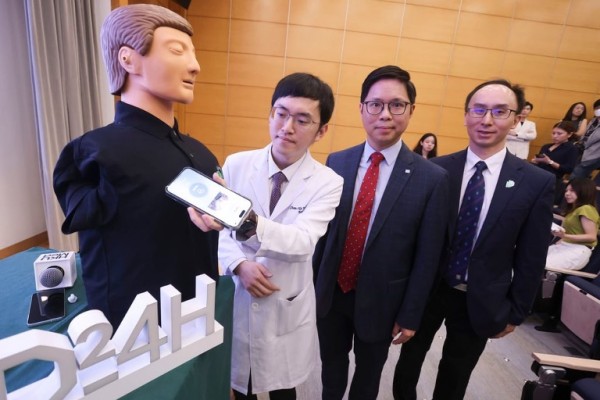University of Hong Kong creates app to detect heart valve diseases by checking chest sounds
August 7, 2024
Source: drugdu
 213
213
The University of Hong Kong has developed a mobile app for members of the public to detect heart valve diseases, with researchers hoping the innovation can help prevent delays in diagnosing and treating such conditions.
A clinical study involving more than 350 patients found accuracy levels for the artificial intelligence-based software were as high as 81 per cent, close to those achieved by cardiologists using stethoscopes.
Such diseases can occur when heart valves fail to open and close properly, resulting in abnormal blood flow. Symptoms include shortness of breath, dizziness and swollen feet.
Professor Joshua Ho Wing-kei of the university’s biomedical sciences school noted on Wednesday that life-threatening heart valve diseases currently affected about 10 per cent of the world’s population above the age of 70.
“Valvular heart disease is often hidden and many only seek medical help when their condition has become serious,” he said.
“We hope patients can make use of a readily available device at home to assess their symptoms, such as a smartphone, so they can seek medical attention quickly for diagnosis and treatment.”
Ho, the lead scientist at the university’s Laboratory of Data Discovery for Health, which helped develop the app, said the Covid-19 pandemic had deterred many people from seeking medical help, resulting in delays in the detection of heart disease symptoms.
The app, which is called Vitogram, is already registered with the US Food and Drug Administration and will launch in Hong Kong in six months, before being made available to countries such as Singapore and Malaysia.
Ho said the app would be “affordable for the general public”, but stopped short of mentioning a possible price.
Users only need to follow the initial instructions and then tap the bottom of the phone against four parts of the chest for 10 seconds each to collect sounds.
They also need an internet connection to use the app.
The software then analyses the sounds to gauge the user’s heart rate and detect any heart murmurs, which appear when blood flows through an abnormal valve.
If the app flags any abnormalities, users are encouraged to seek advice from a general medical practitioner, who can refer them to a cardiologist.
 Dr Wong Chun-ka (left) and professors Joshua Ho and Joseph Wu Tsz-kei demonstrate the use of the new app. Photo: Jonathan Wong
Dr Wong Chun-ka (left) and professors Joshua Ho and Joseph Wu Tsz-kei demonstrate the use of the new app. Photo: Jonathan Wong
The researchers also launched the first stage of its clinical study last December, which involved 363 public hospital patients over the age of 60 and found the app’s accuracy rate was as high as 81 per cent for detecting moderate to severe heart valve problems.
It could also achieve an accuracy of up to 97 per cent when measuring heart rates, according to Ho.
The research team said the app was a rarity on the market as it could analyse the data collected from recording heart sounds without requiring an additional device. In contrast, other assessment tools required users to purchase an additional wearable device that captured pulses and electrocardiograms, instead of heart sounds.
Dr Wong Chun-ka, a cardiologist and clinical assistant professor at the university’s medical school, said the app’s ability to detect structural heart problems, instead of simply rhythmic ones, also helped it to stand out against competitors.
The research team said it planned to conduct the second stage of its study in the near future and aimed to cover a wider range of people and environments to further improve the app’s accuracy.
The team will also explore whether the software can detect other diseases by listening to the sounds of the user’s organs.
The project was funded by AIR@InnoHK of the Hong Kong Innovation and Technology Commission.
Researchers have declined to reveal the cost of developing the app, citing commercial concerns.
https://www.hku.hk/press/press-releases/detail/27585.html
By editorRead more on
- 20-Valent Pneumococcal Vaccine Approved for Clinical Trials January 20, 2026
- ADC205 Tablets Received Approval for Drug Clinical Trial January 20, 2026
- Sifang Optoelectronics makes strategic investment in Changhe Biotechnology January 20, 2026
- Mingde Bio plans to acquire a 51% stake in Hunan Lanyi through capital increase and acquisition January 20, 2026
- accelerating the transition of CLL treatment into a “chemotherapy-free era”. January 20, 2026
your submission has already been received.
OK
Subscribe
Please enter a valid Email address!
Submit
The most relevant industry news & insight will be sent to you every two weeks.



